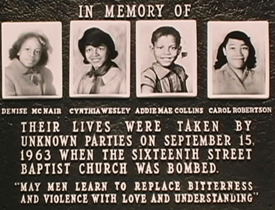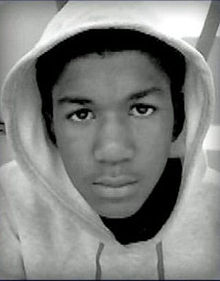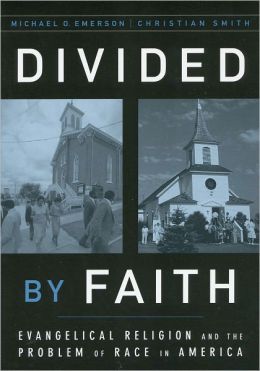Texts: Isaiah 1:1,10-20 + Psalm 50:1-8,22-23 + Hebrews 11:1-3,8-16 + Luke 12:32-40

Fifty years ago next month, the Rev. Dr. Martin Luther King, Jr. had the tragic occasion to deliver a eulogy at the funeral service for three of the four little girls killed in the bombing of 16th St. Baptist church in Birmingham, Alabama on September 15, 1963. In his speech, which is remembered by history as “Eulogy for the Martyred Children,” King spoke of the redemptive power in the blood of those murdered children. He said,
“God still has a way of wringing good out of evil. And history has proven over and over again that unmerited suffering is redemptive. The innocent blood of these little girls may well serve as a redemptive force that will bring new light to this dark city. The holy Scripture says, ‘A little child shall lead them.’ The death of these little children may lead our whole Southland from the low road of man’s inhumanity to man to the high road of peace and brotherhood. These tragic deaths may lead our nation to substitute an aristocracy of character for an aristocracy of color. The spilled blood of these innocent girls may cause the whole citizenry of Birmingham to transform the negative extremes of a dark past into the positive extremes of a bright future. Indeed this tragic event may cause the white South to come to terms with its conscience.”
That was fifty years ago, and this morning I want us to ask ourselves if, indeed, the innocent blood of those four little girls has caused the South, the North, and the whole of these United States to come to terms with its conscience.
 In an article titled, “Why White Evangelical Churches Don’t Wear Hoodies,” published last Friday on the Huffington Post’s religion blog, the Rev. Mae Elisa Cannon, an Evangelical Covenant pastor and graduate of North Park Theological Seminary just three miles north of here, writes,
In an article titled, “Why White Evangelical Churches Don’t Wear Hoodies,” published last Friday on the Huffington Post’s religion blog, the Rev. Mae Elisa Cannon, an Evangelical Covenant pastor and graduate of North Park Theological Seminary just three miles north of here, writes,
“Over the past few weeks, Black churches across the United States grieved and lamented the Zimmerman verdict of ‘not guilty.’ … Many churches of color and others joined in solidarity with Trayvon Martin by wearing their hoodies to worship. Church services addressed concerns of race, the legal system, gun violence, and issues of justice within communities of color.
On the other hand, the vast majority of white Evangelical churches haven’t been talking about the Trayvon Martin case on Sunday mornings. Besides a brief mention and perhaps a prayer the focal point of the Sunday sermon hasn’t been about racial injustice…”
A little further in her article, Cannon describes the reaction Lisa Sharon Harper had to the Zimmerman verdict. Harper is an African American evangelical who works for Sojourners, a national Evangelical organization working on racial and social justice, peacemaking, and environmental stewardship.
“Devoted to the Scriptures, Harper takes to heart the words of Isaiah, ‘Learn to do right; seek justice.’ (Isa. 1:17). In a recent interview, she described her response upon learning the news of the verdict: ‘Shocked. Absolutely shocked … I went to sleep that night feeling numb. I slept hard that night. Then, as soon as I woke up the next morning, I started crying. Weeping. It hit me. The reality of the moment really hit me.’”
Fifty years after the nation was jolted out of its racist slumber by the deaths of four little girls in Birmingham, Alabama we find ourselves divided once more by profoundly different reactions to the death of an African American child. Jurors in Florida, a state with laws that make it possible for a person to kill another person if they feel threatened, to “stand their ground,” struggled to determine whose hands were stained with Trayvon Martin’s blood.
The book of Isaiah opens with the prophet Isaiah speaking as if he were prosecuting a case in a different kind of courtroom, the heavenly court:
“Hear, O heavens, and listen, O earth; for the Lord has spoken: I reared children and brought them up, but they have rebelled against me … What to me is the multitude of your sacrifices? says the Lord; When you come to appear before me, who asked this from your hand? Trample my courts no more; … When you stretch out your hands, I will hide my eyes from you; even though you make many prayers, I will not listen; your hands are full of blood.” (Isa. 1:2,11a,12,15)
The issue of accountability is as complex today as it was for the people of Israel in the time of Isaiah’s prophetic ministry. Imagine how confusing Isaiah’s righteous anger would have sounded to the average Israelite, the kind of person who rose early, worked hard all day long, paid his taxes and made his offerings at the Temple.
“What to me is the multitude of your sacrifices? says the Lord; I have had enough of burnt offerings of rams and the fat of fed beasts; I do not delight in the blood of bulls, or of lambs, or of goats … bringing incense is futile; incense is an abomination to me. New moon and sabbath and calling of convocation — I cannot endure solemn assemblies with iniquity. Your new moons and your appointed festivals my soul hates; they have become a burden to me, I am weary of bearing them.” (Isa. 1:11,13-14)
It’s easy enough for us, reading through the text from a safe distance, to join with Isaiah in denouncing the hypocrisy of his time, of rulers and peoples who gather to worship God with their lips but not with their lives. From the perspective of that everyday Israelite, however, it’s not so easy to understand what is being asked for.
Those people, like Ryan and Gina who have brought their daughter, Chiara, for the appointed festival of baptism, were simply trying to live their lives with some sense of reverence for God in light of a tradition that was passed down generation after generation. Those people’s offerings in the temple, like Chiara’s baptism this morning, were a way of keeping faith with the traditions that had shaped the identity not only of those individuals, but of a community, of an entire nation.
Like the ancient Israelites, we have words and actions we perform as signs of commitment to the God who calls people out of slavery; who brings people into lands of abundance; who restores the exiled; who heals the sick and comforts the dying; who brings new life to people and places left for dead. We have even incorporated Isaiah’s critique of empty religion into our own rituals, so that as Chiara was baptized this morning we asked her parents to promise before God and before the whole Church that they would raise Chiara to proclaim Christ through word and deed, to care for others and the world God made, and to work for justice and peace.
But doesn’t Isaiah’s spirit push back against our sense of satisfaction? After all, so many baptized people in the world, so many promises made in sanctuaries just like these, and still so many eulogies being preached at so many funerals.
In describing the difference in perception that shapes the radically different response to public events like the Zimmerman verdict by White communities and communities of color, Mae Elise Cannon cites the work of Michael Emerson and Christian Smith, authors of Divided by Faith: Evangelical Religion and the Problem of Race in America.
“Emerson and Smith describe the findings of thousands of phone interviews and hundreds of face-to-face interviews they conducted for their sociological study. In general, the found, White evangelicals view the world through the paradigm of rugged individualism, relationships, and anti-structuralism. Black evangelicals also view the world through a lens of rugged individualism and relationships, but they are not anti-structural. Rather, they understand the impact of systems and structures on whole people groups.”
In this regard, I think the historic Black church, and communities of color in general, may be better situated to understand the voice of the prophet Isaiah, who is not, really, addressing the people of Israel as individuals, but as a community, as a nation.
The difficulty of a ruling like the one in the George Zimmerman trial is that the jurors were able to find him innocent under the law, even though we know that individual jurors felt certain that he was guilty in some obvious sense. That he was culpable for the death of Trayvon Martin, even if he was not held accountable.
It is that gap, the gap between culpability and accountability, through which the stain of a single death spreads out to mark the community around it. It is the tragic gaps in our systems of justice, in our laws, in our public policy, in our sentencing guidelines, in our penal system — systems none of us own individually, but all of us own together — that leave us praying with blood-soaked hands.
Tomorrow morning I’ll be leaving for Pittsburgh for the 2013 ELCA Churchwide Assembly. At this assembly, our denomination will be debating whether or not to adopt a social statement on Criminal Justice that has been in the works for six years now. Some of you took part in our own study of an early draft of the proposed social statement a couple of years ago. The proposed social statement, in its current form, makes the following basic points:
- The ELCA is prompted to speak and to act because so many cries of suffering and despair emerge from the criminal justice system — from victims, the incarcerated, their families, communities, those wrongly convicted, those who work in the system — and have not been heard.
- Drawing from Holy Scripture, this church holds up a vision of God’s justice that is wondrously richer and deeper than human imitations and yet is a mirror in which justice in this world, God’s world, must always be assessed.
- A fundamental transformation of mindset about criminal justice is required that challenges the logic of equating more punitive measures with more just ones. Individuals must be held accountable, but every person in the criminal justice system deserves to be seen and treated as a member of human communities, created in the image of God and worthy of appropriate and compassionate response.
- Because mass incarceration causes significant harms, both personal and social, the ELCA strongly urges those who make and administer correctional policies to take all appropriate measures to limit the use of incarceration as a sanction for criminal offenses. Toward that end, this statement identifies three specific paths: pursue alternatives to incarceration, reform sentencing laws and policies, and closely scrutinize national drug policy.
- Four other imperatives also require vigorous action from policy makers: the criminal justice system must acknowledge the disparities, and address the implicit and explicit racism that persists within; it must recognize the special needs of juvenile offenders; it must also stop the privatization of prison facilities; and finally, it must foster the full reintegration of ex-offenders into community.
(from the ELCA’s “The Church and Criminal Justice: Hearing the Cries. A Proposed Social Statement on Criminal Justice. Brief Overview”)
It was Dr. King’s hope, and the prayer of every parent and person of conscience who gathered to mourn the loss of those four little girls, that those “tragic deaths may lead our nation to substitute an aristocracy of character for an aristocracy of color.” Dr. King suggested that our nobility derives from how we act rather than how we look, and in this judgment he echoes the judgment of the prophet Isaiah, who said,
“Wash yourselves, make yourselves clean; remove the evil of your doings from before my eyes; cease to do evil, learn to do good; seek justice, rescue the oppressed, defend the orphan, plead for the widow.” (Isa. 1:16-17)
I would ask you to pray for our church, the ELCA, as we gather in assembly this coming week. Pray for the Holy Spirit to guide us in all wisdom, so that the divisions that characterize our nation might be set aside for the sake of a probing, prayerful, and prophetic statement from the church God has called to the world God has created, and loves, and is laboring to restore. Pray that the spilled blood of too many children might find a voice in our assembly, so that their deaths might not be in vain. Pray, most of all, that at the end of all our debates and our voting that the church’s action would be more than words, more than one more burdensome solemn assembly. That whatever social statements we pass would find their ultimate expression in the lives we lead and the actions we take as a community gathered and sent for the sake of the world.
In Jesus’ name,
Amen.
